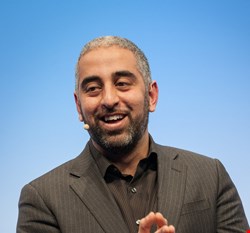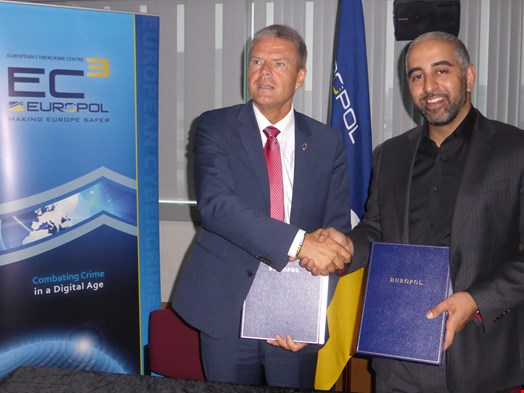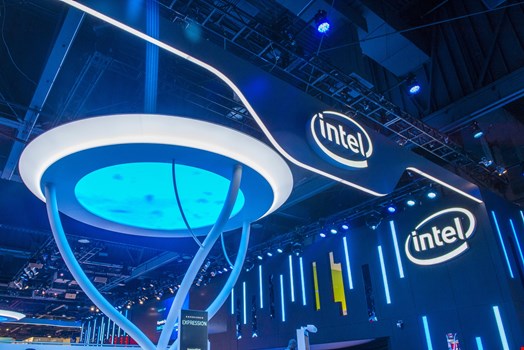
CTO. Author. Europol advisor. Information security enthusiast. Husband. Father. And not in that order. Eleanor Dallaway talks to Intel Security VP & CTO EMEA, Raj Samani, a man so passionate about his industry that he manages to turn a weekend at Legoland into an infosec lesson for some of the park’s young visitors
When I meet with Raj Samani on a Monday morning at the Intel offices in Slough, he’s ‘fresh’ from spending the weekend with his wife and three children on a “rock hard” bed at Legoland, where he indulged in reading up everything he could find on the Carbanak malware news that broke that weekend, and gave a technology career lesson to one of the park’s unsuspecting young visitors.
But don’t assume Samani has fallen into the trap of workaholic – the Carbanak news is to him what the latest episode of Game of Thrones is to some people, and educating children on not only the dangers of cyber, but the opportunities, is his passion. “I know how to turn my phone off and have dinner with my family,” he says. “Reading that news isn’t work to me, it’s what I’m interested in. If I wasn’t doing this job, I would be reading that anyway.”
To switch off, Samani is an avid gym-goer, and loves to box. “Mainly, I’ve learned to listen to my body. If my mind says to me, ‘you can’t read any more, just watch crappy TV’, I’ll do that. If my body says to me, ‘hey listen – you really can’t go to the gym this morning’, I’ll go back to sleep.”
Wearing some pretty big shoes as VP & CTO EMEA of Intel Security, formerly McAfee, Samani could be forgiven for finding it all a bit too much sometimes. But, he reassures me, he’s “happy, really, really happy.
“It’s not work to me, sometimes I have to pinch myself and think, ‘people are paying me to do this’, because I would do this for free.”
Those big shoes allow him the ability to “help influence change right across the industry,” and whilst Samani has worked at this with industry bodies like ISSA and CSA in previous roles, his current job allows him to “push things on faster and further.
“Would I ever have been able to help redevelop Bletchley Park when I was in the voluntary sector, or working as part of the industry forums and associations? No. Would I have had the ability to be able to stand and speak at some of the biggest conferences around the world? Probably not. Would the white papers I’ve written ever have got the same exposure? No. So that’s why I came to McAfee,” Samani explains to me. If those words sound arrogant in print, they didn’t in person, and Samani’s sincerity is always both refreshing and unmistakable.
"Sometime I have to pinch myself and think, 'people are paying me to do this', because I would do this for free"
I’ve known Samani for nine years, and when we first met he was working as a CISO in the public sector. I chose him as part of the working group that I was asked to assemble in order to present at the House of Commons to help advise the Conservative Party on their information security policy. Since then, I’ve always considered Samani an industry ‘favorite’ and have spent many interviews, lunches, and casual chats enjoying his honesty, sincerity, and passion for the industry. And these encounters are never short…the man can talk!
Just a Skinny Indian Boy from Slough
These are Samani’s words, not mine. “I’m just a skinny little Indian boy from Slough, and now I couldn’t even tell you which country I’m going to be in next week,” Samani laughs, contemplating the path he took from his small home town in Wembley, North London, where he didn’t even know the role of CTO existed, to his jet-setting senior position at one of the world’s largest technology companies.
“I grew up in a time where technology wasn’t ubiquitous. My dad ran a hotel and my mum was an accountant, and we didn’t have a computer.” That was, until Samani’s dad presented him with a Pentium 75, which he taught himself how to use. “Technology allows anybody the ability to be able to explore the limit of their potential,” he says. “Technology is agnostic – it’s not good, or bad – if you have an appetite to learn, it enables that.” And an ability to learn is one of the most powerful skills there is, adds Samani.

It’s abundantly clear that beside his family, Samani’s passion for learning is the only thing that trumps his passion for information security. After earning a degree in economics, and a Masters in business information technology from Brunel University, Samani carried on studying whilst working in his first role as tech support at Roche Pharmaceuticals. “See, I’ve always been a techie,” he smiles.
He took 35 professional exams in his ‘free’ time, and read “any piece of information I could get my hands on, day and night”. This included Applied Cryptography: The Second Edition which he took on his honeymoon!
Samani even turned to textbooks to overcome his fear of public speaking. “I hated it, couldn’t sleep for days knowing it was coming up, but knew I had to face my fear,” he recalls. “I started to read about some of the best speakers in the world, their approaches, how they do it.” The knowledge he gained, combined with his belief in the ‘seven seconds of courage’ mentality, allowed him to overcome his fear and accept his first speaking engagement at Infosecurity Europe.
“I always say to my kids, if there’s something you’re scared of, just be brave for seven seconds.” And it worked for Samani, who now loves public speaking, but admits that he still gets butterflies and still gets scared.
These days, his passion for learning finds Samani writing books, not just reading them. “I use writing books as a vehicle to increase my technical understanding on topics where I want a deeper knowledge, like smart grids,” he explains. “When I write my books, my wife is sitting watching EastEnders, and I’m next to her searching for places to buy cheaper email addresses for spear-phishing.”
“When I write my books, my wife is sitting watching EastEnders, and I’m next to her searching for places to buy cheaper email addresses for spear-phishing”
His latest project is a co-authored book with Eric Knapp and Christopher Burgess called The Unsocial Network, which aims to straddle general interest with technical knowledge, and asks whether we’re less social today than we were in the past. “Social networks have changed from being based on physical proximity to being based upon people with which you share common interests. Today, if somebody disagrees with you, you unfollow them. You disconnect them from your social network. So there isn’t anybody that challenges our belief system, you only surround yourself with people that reinforce your belief system.” Samani hopes that the book will appeal to his wife, “and absolutely everyone else.”
No Such Thing as Too Busy
When I ask Samani how he finds time to pen books whilst balancing his day job, family life, and extra-curricular activities (Samani volunteers in schools educating children about cybersecurity, works with MPs on an all-party parliamentary group focused on technology, and acts as a member of the advisory group on internet security at Europol Cybercrime Centre), he answers simply: “You have to make time. There’s no such thing as being too busy – it’s just not prioritizing stuff.” Samani uses his travel time – and there’s a lot of that, as he travels weekly – to write, “and the fun part is, it’s not even work, because I love doing this.
“This industry isn’t just a job, it’s a passion. What we do is really important. The industry can be quite depressing, dark, but we have an industry that is working collaboratively, both public and private sector, and many of us [partake in] voluntary efforts outside of normal working hours.”
Could we be doing more on the collaboration side? “We could always be doing more, but the reality is that information exchanges and information sharing has been going on for more than just a few years now. What we need is more real-time intelligence and information-sharing to be able to combat these issues.”
Samani considers his job partly reactive and partly proactive, which is why, he explains, there is no such thing as a normal day for him. “It doesn’t feel like a job, if that makes sense? It’s just something I do.” And he plans to do exactly that for the foreseeable future. “I’m certainly not consciously thinking about leaving, but then, never say never, right?”

As a technologist, Samani describes being acquired by Intel as “like Christmas. The breadth and the depth and the capability of the individuals here is just awesome,” he gushes. And it’s people that continue to inspire him both within and outside the Intel walls. “There are so many people in our industry that are just really good people. A huge part of my social friendship network is from industry – as I said earlier, you attract people similar to yourself.” Indeed, it’s the relationships and friendships that Samani has made and maintained that he is proudest of.
As for regrets, Samani is fairly philosophical. “Hindsight’s a wonderful thing, but equally, mistakes help define who we are. You learn nothing from success, only from failure,” he says. “So yes, I have failed on a number of occasions, but I don’t see them as failures, I see them as learning opportunities, so I wouldn’t change it.” His mistakes have helped define who he is today, Samani continues, adding that the industry’s lack of risk assessment framework to quantify security is one objective that he is yet to see fulfilled.
The Most Important Job of All
His most important job of all, Samani considers, is being a dad; helping his children navigate the rules of the new technical world that we’re moving into is his upmost priority. “I kind of bear this burden of responsibility as a father, but also, as a CTO in this company, that I’ve got to not only help my kids, but as many people as I can.
“When we look at privacy in the 21st century, it’s going to be completely different to how privacy was in the 20th century. There are new rules being created, new societal norms, and we need to help preserve the foundations of trust that we need to operate in this world.”
So will Samani be encouraging his children to embark on careers in technology? “I’d just like them to find their passion. I keep saying to my kids that they can do anything and be anything they want.” Teaching them a real degree of technical competence is high on his agenda, however, “because that’s important not only for their future careers, but generally in society.”
Perhaps it’s this “burden of responsibility” that is to thank for Samani’s involvement in the Europol Cybercrime Centre advisory group. “My work and engagement with Europol is really because of Troels Oerting’s vision. He recognized that cybercrime isn’t something that the public sector can do alone, and so began this process of putting together this advisory council of special advisors.
Samani’s admiration for Oerting is apparent, and he applauds the collaboration he has enabled between law enforcement agencies across the world, in addition to the private-public partnership. “The fruits of his vision and the fruits of his labor have been recognized in some of the takedowns and efforts we’ve seen over the last 12 months.”
So what’s next for Samani? “There used to be a time when I could almost map out my life. I’d tell you when I would be married, when I’d have kids, where I’d be working, and what sort of money I’d be earning,” he says, pausing to reflect. “And now, actually the most exciting thing is that there isn’t a path set out for me.”
A self-confessed over-analyzer, and his own biggest critic, whatever does come next will undoubtedly be met with the same commitment and passion that Samani affords to everything else in his life. “My goals are always changing,” he admits, with that mischievous grin that is synonymous with the Intel Security CTO. Not bad for a “skinny little Indian boy from Slough.”
This feature was originally published in the Q2 2015 issue of Infosecurity – available free in print and digital formats to registered users
